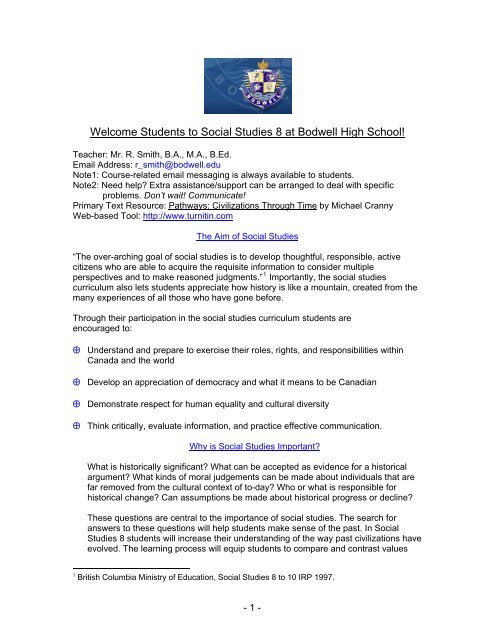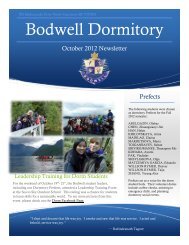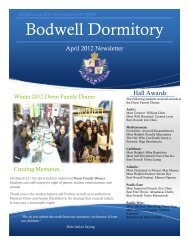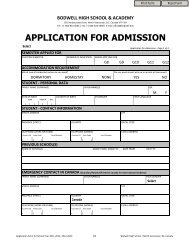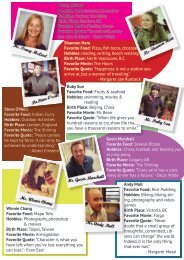Social Studies 8 - Bodwell High School
Social Studies 8 - Bodwell High School
Social Studies 8 - Bodwell High School
You also want an ePaper? Increase the reach of your titles
YUMPU automatically turns print PDFs into web optimized ePapers that Google loves.
Welcome Students to <strong>Social</strong> <strong>Studies</strong> 8 at <strong>Bodwell</strong> <strong>High</strong> <strong>School</strong>!<br />
Teacher: Mr. R. Smith, B.A., M.A., B.Ed.<br />
Email Address: r_smith@bodwell.edu<br />
Note1: Course-related email messaging is always available to students.<br />
Note2: Need help? Extra assistance/support can be arranged to deal with specific<br />
problems. Don’t wait! Communicate!<br />
Primary Text Resource: Pathways: Civilizations Through Time by Michael Cranny<br />
Web-based Tool: http://www.turnitin.com<br />
The Aim of <strong>Social</strong> <strong>Studies</strong><br />
“The over-arching goal of social studies is to develop thoughtful, responsible, active<br />
citizens who are able to acquire the requisite information to consider multiple<br />
perspectives and to make reasoned judgments.” 1 Importantly, the social studies<br />
curriculum also lets students appreciate how history is like a mountain, created from the<br />
many experiences of all those who have gone before.<br />
Through their participation in the social studies curriculum students are<br />
encouraged to:<br />
⊕ Understand and prepare to exercise their roles, rights, and responsibilities within<br />
Canada and the world<br />
⊕ Develop an appreciation of democracy and what it means to be Canadian<br />
⊕ Demonstrate respect for human equality and cultural diversity<br />
⊕ Think critically, evaluate information, and practice effective communication.<br />
Why is <strong>Social</strong> <strong>Studies</strong> Important?<br />
What is historically significant? What can be accepted as evidence for a historical<br />
argument? What kinds of moral judgements can be made about individuals that are<br />
far removed from the cultural context of to-day? Who or what is responsible for<br />
historical change? Can assumptions be made about historical progress or decline?<br />
These questions are central to the importance of social studies. The search for<br />
answers to these questions will help students make sense of the past. In <strong>Social</strong><br />
<strong>Studies</strong> 8 students will increase their understanding of the way past civilizations have<br />
evolved. The learning process will equip students to compare and contrast values<br />
1 British Columbia Ministry of Education, <strong>Social</strong> <strong>Studies</strong> 8 to 10 IRP 1997.<br />
- 1 -
and belief systems from different civilizations. Students will engage with four content/<br />
concept learning units: Forging Civilizations 500-1200, Medieval Perspectives 1100-<br />
1400, Europe Prospers 1400-1700, and Kingdoms and Dynasties 900-1600.<br />
Medieval Western Europe, The Middle East, India, China, and Japan will be<br />
explored, with regular attention being given to the role of geography on cultural<br />
development.<br />
Prescribed Learning Objectives<br />
By the end of the course students will be able to:<br />
1. Application of <strong>Social</strong> <strong>Studies</strong>.<br />
1.1 identify and clarify a problem, an issue, or an inquiry<br />
1.2 gather and organize a body of information from primary and secondary print<br />
and non-print sources, including electronic sources<br />
1.3 interpret and evaluate a variety of primary and secondary sources<br />
1.4 assess a variety of positions on controversial issues<br />
1.5 plan, revise, and deliver written and oral presentations<br />
1.6 co-operatively plan and implement a course of action that addresses the<br />
problem, issue, or inquiry initially identified<br />
2. Society and Culture: Civilizations From 500 to 1600.<br />
2.1 identify factors that influence the development and decline of world civilizations<br />
2.2 compare daily life, family structures, and gender roles in a variety of<br />
civilizations<br />
2.3 describe a variety of diverse cultural traditions and world religions<br />
2.4 demonstrate awareness of artistic expression as a reflection of the culture in<br />
which it is produced<br />
2.5 identify periods of significant cultural achievement, including the Renaissance<br />
2.6 describe how societies preserve identity, transmit culture, and adapt to change<br />
3. Politics and Law: Civilizations from 500 to 1600.<br />
3.1 demonstrate understanding of the tension between individual rights and the<br />
responsibilities of citizens in a variety of civilizations<br />
3.2 assess the impact of contact, conflict, and conquest on civilizations<br />
3.3 describe various ways individuals and groups can influence legal systems and<br />
political structures<br />
3.4 explain the development and importance of government systems<br />
4. Economy and Technology: Civilizations from 500 to 1600.<br />
4.1 compare basic economic systems and different forms of exchange<br />
4.2 analyse the effect of commerce on trade routes, settlement patterns, and<br />
cultural exchanges<br />
4.3 compare the changing nature of labour in rural and urban environments<br />
4.4 describe the impact of technological innovation and science on political, social,<br />
and economic structures<br />
5. Environment: Civilizations from 500 to 1600.<br />
5.1 construct, interpret, and use graphs, tables, grids, scales, legends, and various<br />
types of maps<br />
- 2 -
5.2 locate and describe major world landforms, bodies of water, and political<br />
boundaries on maps<br />
5.3 locate and describe current and historical events on maps<br />
5.4 describe how physical geography influenced patterns of settlement, trade, and<br />
exploration<br />
5.5 analyse how people interacted with and altered their environments, in terms of:<br />
population, settlement patterns, resource use, and cultural development.<br />
Student Assessment<br />
Assessment Categories: Weights:<br />
Assignments 25%<br />
Tests 25%<br />
Participation:<br />
10%<br />
o Homework Completion<br />
o Teamwork<br />
o In-class contribution-making<br />
o Expectations (see below)<br />
Mid-term Exam 20%<br />
Final Exam 20%<br />
Total 100%<br />
Expectations<br />
Students will:<br />
1. Show respect to others.<br />
2. Arrive on time.<br />
3. Apply ‘Talking Stick’ procedure, i.e., one person speaks/everyone else listens.<br />
4. Use (wireless card equipped) lap-top technology.<br />
5. Use English in the classroom and on-line (EOP Policy).<br />
6. Raise a hand to ask a question.<br />
7. Wear the <strong>Bodwell</strong> uniform proudly and well.<br />
8. Be organized: Textbook/Course Binder/Agenda/Computer e-Folders.<br />
9. Adhere to <strong>Bodwell</strong> <strong>High</strong> <strong>School</strong> Handbook policies<br />
Note1: Assignment Late Penalties: 10% per day/Maximum 30%. Assignments at the<br />
30% point may or may not be accepted. Submission dates and times as provided by<br />
http://turnitin.com will be taken as being ‘official’, where appropriate.<br />
Note2: Please: No cellphones/no iPods/no Chat. Thanks for your co-operation!<br />
Let’s have a great semester!<br />
- 3 -


